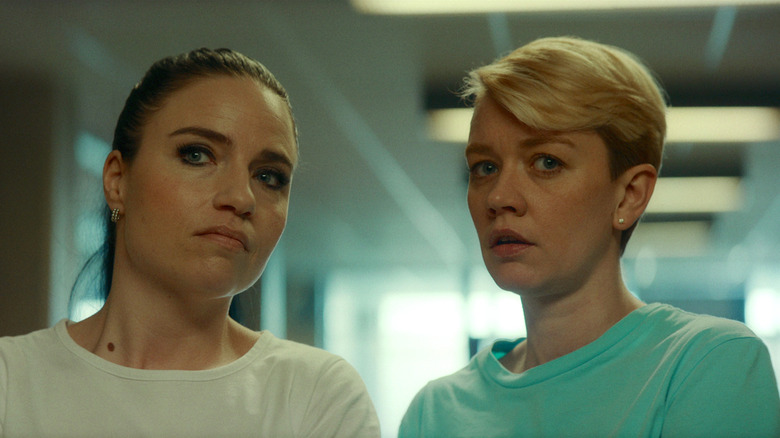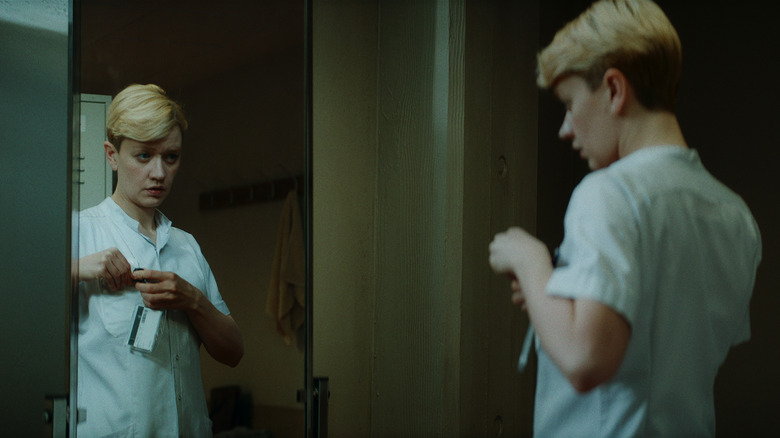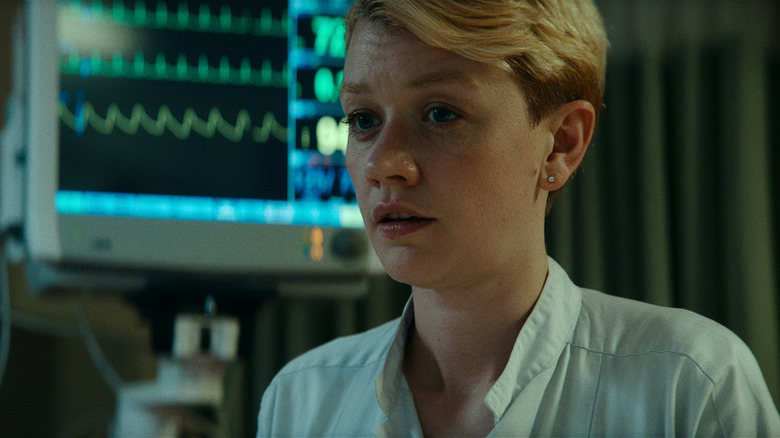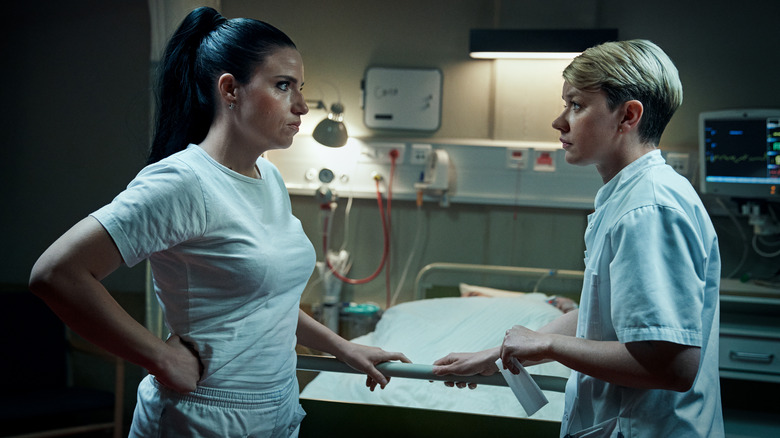The Nurse: The True Story Behind Netflix's Crime Miniseries
If there is one thing that seems to be overwhelmingly popular these days in the world of entertainment, it's true crime. Netflix's newest miniseries, "The Nurse" focuses on Pernille Kurzmann Larsen (Fanny Louise Bernth) and Christina Aistrup Hansen (Josephine Park), and as one can tell by the trailer, the Danish miniseries is all about Larsen's new job at the same hospital as the seemingly loved Hansen. However, after the pair are able to save some people and are considered to be a dream team by the staff, several issues arise that soon cast some doubt on Hansen. This is because many coincidences arise that paint the heroic efforts of Hansen as something far more sinister.
As harrowing as the tale that Netflix spins is, the story is entirely based in reality (like many other Netflix endeavors), which makes "The Nurse" even more terrifying. The real-life Hansen deliberately poisoned weakened patients, which allowed her to sometimes save them and receive heaps of praise, while other times her clandestine efforts would result in a death. Speaking with Tudum, the director of "The Nurse" Kasper Barfoed said, "What really most of all interested me [was], 'How could this take place over such a long time — when, after the whole thing was revealed, a lot of people seemed to have known about it or suspected it?' That became the key we always went back to. It's not about just a 'crazy' killer — it's about, 'How does the system prevent us from speaking up or how does the system protect itself?'"
Hansen was called a 'devil of death' by a prosecutor
Telling its story over four episodes, "The Nurse" truly is based on actual events and isn't stylized as much as some other stories that are based in reality. The real-life Christina Aistrup Hansen was convicted in 2016 of multiple counts of murder and attempted murder for her handling of patients at Nykøbing Falster Hospital in Denmark. According to the Danish publication Berlingske, the evidence presented at Hansen's trial highlighted that she had used a combination of morphine and other drugs to cause unjust harm in order to make herself out to be a hero.
Sentenced to life imprisonment, Hansen's trial was overseen by a panel of three judges and a jury, who all came to the same verdict — guilty. Prosecutor Michael Boolsen said at the time of the trial, "The patients were extras in a horrible play. If you are admitted to a hospital, you expect professional and appropriate care that is professionally competent. But what have the four patients here received? An unprofessional, incompetent, and inappropriate treatment, where there was regularly talk of murder. Is it possible to imagine something more aggravating?" Boolsen added, "The defendant was not an angel of death, she was a devil of death."
Hansen's trial had over 70 witnesses
As reported by the Toronto Sun in 2016, Hansen was arrested on March 1, 2015, before being charged with three counts of murder and one count of attempted murder. The victims were two men and one woman between 2012 and 2015, with the fourth victim having survived the poisoning. The publication also went on to note that all of the patients were over the age of 65 and that they all had similar toxicology reports when it came to foreign substances in the blood; this is part of the reason why a conviction came easily against Hansen. The trial for Hansen started on March 11, 2016, and the final sentence of that trial arrived in June of that year.
Sky News offered a deeper look into the result of Hansen's trial and noted that there were over 70 witnesses that attested to their suspicion that Hansen was deliberately trying to harm patients. A psychological evaluation presented at Hansen's trial showed that she was not mentally ill, but it did clarify that Hansen displayed characteristics of egocentricity and a constant need for excitement. In addition to life imprisonment, Hansen also was forced to pay 46,000 euros to the family of one victim, and 2,700 euros to the victim that survived.
Hansen appealed her verdict, and her sentence went from life imprisonment to 12 years
However, despite the unanimous verdict of Hansen's trial, she still appealed the result, and in 2017, her case was heard by one of the High Courts of Denmark, as reported by the Danish website Domstol. Although this particular court still found that Hansen was guilty, they reduced her sentence from life imprisonment to 12 years and changed the murder charges to attempted manslaughter. Still, Netflix's "The Nurse" does a great job of uncovering the events which led to Hansen's arrest, and they revolve around the whistleblower and main character of the miniseries, Pernille Kurzmann Larsen.
In the aforementioned interview with Tudum, director Kasper Barfoed explained why he wanted to properly portray Larsen by saying, "So many people suspected something or saw something — and yet it's the new nurse, the one who's in her first job who not only senses something is wrong, but who actually does something about it and risks everything. [Making the series] became a lot about trying to be loyal to Pernille and the situation she was in. We wanted the audience to be able to feel how difficult this is. It's not just pushing a button and then you're a whistleblower."



